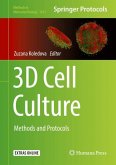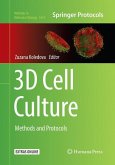Developed for a range of tissues where the culture environment takes into account the spatial organization of the cells therein, 3D cell culture models serve to bridge the gap between in vivo studies at one extreme with that of simple cell monolayers at the other. In 3D Cell Culture: Methods and Protocols, international experts describe a number of basic and applied methodologies taken from a breadth of scientific and engineering disciplines, many of which deal with direct applications of 3D culture models, most notably in the formation of tissues for clinical purpose. Beginning with an overview of the biological and materials scaffold requirements for successfully creating 3D models, the book delves into topics such as general scaffold design and fabrication techniques, models for bone, skin, cartilage, nerve, bladder, and hair follicles, and chapters on bioreactor design, imaging, and stem cells. Written in the highly successful Methods in Molecular Biology(TM) series format, chapters include brief introductions to their respective subjects, lists of the necessary materials, step-by-step, readily reproducible laboratory protocols, and notes on troubleshooting and avoiding known pitfalls.
Authoritative and cutting-edge, 3D Cell Culture: Methods and Protocols serves as a basic manual for laboratory-based scientists who not only need to have a comprehensive range of techniques contained within a single text but also require techniques described using a standard, convenient format.
Authoritative and cutting-edge, 3D Cell Culture: Methods and Protocols serves as a basic manual for laboratory-based scientists who not only need to have a comprehensive range of techniques contained within a single text but also require techniques described using a standard, convenient format.
From the reviews:
"This book is an excellent resource to help researchers find practical information to enable them to develop three-dimensional cell culture systems. ... anyone who wishes to enter this field should be able to use this book to develop their own bespoke 3D system. In conclusion, I would recommend this book as being very useful to a wide audience ... . will be essential for graduate students and postdocs as well as to investigators wishing to expand their work into 3D cell culture and tissue engineering." (Julian B. Chaudhuri, ChemBioChem, Vol. 12, 2011)
"A necessary book for all who use cell culture. No other words can better tell the reader about this compendium of the most innovative culture techniques we hold to try to reach the ultimate goal of cell culture ... . For those who wish to enter the field, some introductory reviews explain the present-day challenges in 3D culture while more detailed protocols talk about bioreactors and agarose constructs." (Carlo Alberto Redi, European Journal of Histochemistry, Vol. 55, 2011)
"This book is an excellent resource to help researchers find practical information to enable them to develop three-dimensional cell culture systems. ... anyone who wishes to enter this field should be able to use this book to develop their own bespoke 3D system. In conclusion, I would recommend this book as being very useful to a wide audience ... . will be essential for graduate students and postdocs as well as to investigators wishing to expand their work into 3D cell culture and tissue engineering." (Julian B. Chaudhuri, ChemBioChem, Vol. 12, 2011)
"A necessary book for all who use cell culture. No other words can better tell the reader about this compendium of the most innovative culture techniques we hold to try to reach the ultimate goal of cell culture ... . For those who wish to enter the field, some introductory reviews explain the present-day challenges in 3D culture while more detailed protocols talk about bioreactors and agarose constructs." (Carlo Alberto Redi, European Journal of Histochemistry, Vol. 55, 2011)








